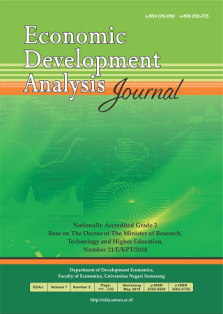Does Corruption, Unemployment, and Investment Affect Economic Growth in ASEAN-9
Abstract
This research aims to analyze causality relationships and see the impact of different periods on the short- and long-term macroeconomic and non-economic variables in nine ASEAN countries, using the period from 2012 to 2022. This research uses the Granger causality approach and the Vector Error Correction Model to answer the problems in this research. The empirical results show no causal relationship between the variations in macroeconomic and non-economic variables used in this research. However, in the short term, we found that the interaction of macroeconomic and non-economic variables had a significant mutual influence. On the other hand, in the long term, corruption and unemployment have a significant and negative effect on economic growth, followed by foreign direct investment, which has a significant and positive effect on economic growth. More than that, we found an interesting thing: short- and long-term corruption is like a double-edged sword. In the short term, corruption is a driving force in the ASEAN economy, but in the long term, it causes something destructive for economic growth.


